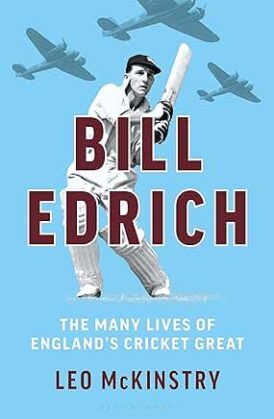Bill Edrich
Martin Chandler |Published: 2024
Pages: 250
Author: McKinstrey, Leo
Publisher: Bloomsbury
Rating: 4.5 stars

One of my sporting heroes is Robin Friday, a man who briefly played as a striker for my football team, Reading, in the early 1970s, and even more briefly, after Reading found him to hot too handle, for Cardiff City. A great deal appealed to me about Friday, not least the comment he made to his second manager at Reading, I’m half your age and I’ve lived twice your life.
Some tales about Friday’s excesses are doubtless apocryphal, but many are true. He is the subject of a superb biography by former Oasis bassist Paul McGuigan, The Greatest Footballer You Never Saw. In most aspects of their lives there is no comparison to be made between Friday and Bill Edrich, and if faced with Friday Edrich would doubtless have thoroughly disapproved of much of his behaviour, but he would have liked his comment to Evans, one he would certainly have identified with.
As a cricketer Edrich fell, in statistical terms, a little way short of greatness, his Test batting average being exactly 40. His ability with the bat was not Edrich’s only contribution though, as he was a fine fieldsman, but the briefly genuinely fast bowling that he was capable of was not quite effective enough to justify describing him as a true all-rounder.
But there were some fine performances along the way. The double century in the timeless Test after a dreadful start to his Test career was one, and he was one England player to emerge with credit from the 1946/47 Ashes series. In addition Edrich was at the wicket in 1953 when the Ashes were finally recovered for the first time since 1932/33. In purely cricketing terms however his most famous achievements were those of the 1947 summer when, with the man dubbed his twin, Denis Compton, records were set that will never be approached let alone broken.
There have been many accounts written of Edrich’s cricketing deeds. All his Test matches are well covered, there are two accounts of the 1947 summer, a couple of biographies, and Edrich himself gave his name to three volumes of autobiography. So however well written a life of Edrich the cricketer is, it is never going to add a great deal to our knowledge of his cricket career. As to the rest of action packed life however, there is a gap to be filled.
The Edrich clan, from Norfolk, have an interesting background, but without McKinstrey’s book it is not something that would have been anything like as clear as it is. Helped inevitably by thorough research Edrich’s two sons were instrumental in making this account as fully rounded as it is, and other members of the Edrich clan contribute as well.
Squadron Leader Edrich DFC, as he was when he left the RAF was, unlike some, a 24 carat war hero, who piloted Blenheim bombers during the early part of the war. Everyone with any interest in the man knew that of course, but the details of the missions that he carried out are enlightening. Did he suffer from some sort of Post Traumatic Stress Disorder? We’ll never know the answer to that one, but at least McKinstrey poses the questions, and looks at the limited evidence that there is.
And then there is the Edrich character. He is certainly a man of contradictions. Always a walker he hated the idea that any batsman would do otherwise, yet with the ball in his hand he didn’t have the same qualms when it came to dealing with umpires. In a very different field of human endeavour the concept of fidelity was anathema to Edrich, his five marriages being testament to that. But despite his disregard for his marriage vows he does at least seem to have been honest about is misdeeds with the many ladies in his life.
Another facet of Edrich’s life is that when his cricket career began he was a professional, but after the Second World War he became an amateur. He was a decent captain, and undoubtedly would have liked to be captain of England, but disciplinary issues meant that was never going to happen. It is also interesting to learn how he earned the living that enabled him to play as an amateur, and beyond his playing days to maintain his lifestyle. There were a number of businesses, some more successful than others, including involvement in an ultimately failed financial services venture that, despite his role amounting to one promoting a ‘Ponzi Scheme’, Edrich was able to emerge from largely unscathed.
Bill Edrich is an excellent book, and no one should be put off purchasing it on the basis they think they already know all they need to know about its subject, as I can assure them that they do not. As he has demonstrated in the past in his biographies of Geoffrey Boycott and Jack Hobbs McKinstrey is a master of the biographer’s craft, and he has done as good a job as it is possible to do at this distance to unravel the complexities of Edrich’s personality.






Leave a comment